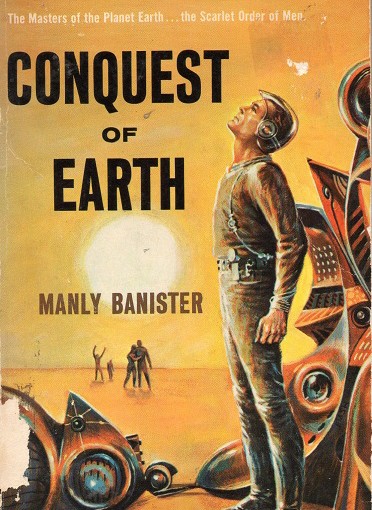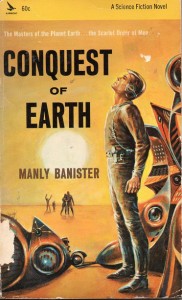Book Review: Conquest of Earth by Manly Banister
Note: This review will contain SPOILERS for some major plot twists beyond a certain point.
Today Kor Danay is a Man. It is the distant future, when Sol has become a red star, and Kor has completed nineteen years of intense mental and physical training to become a Scarlet Sage of the Brotherhood of Man. Only six out of a class of one hundred have managed to attain the abilities of instantaneous teleportation over galactic distances, moving so fast time seems to stand still, reading minds, etc. And Kor is the first initiate ever to survive taking the extra credit option of summoning stellar fire to the surface of a planet.
But Kor and his four surviving classmates (one other tried the extra credit option) are bound by oath to conceal their Dragonball Z-level powers from the world. For the Men are not the masters of Earth. Earth, and all civilized worlds, are under the control of energy beings called the Trisz, who may or may not be multiple manifestations of a single mind. The Trisz have been slowly draining Earth of its water, and under the guise of benevolent protection have turned humanity into a servant race. If the Trisz knew just how powerful the Men really were, they would simply destroy Earth, which wouldn’t necessarily kill the Men, but would eliminate the People the Men want to free.
So as far as the rest of humanity knows, the Men are just philosopher-priests with maybe some holy miracles once in a while, though few people ever see even one. Kor is shipped off to be the new head priest of No-Ka-Si, in the desert that was once known as Kansas. There he must match wits with the treacherous Brother Set of the Blue Brethren (those students of the Brotherhood who washed out before the training became lethal) and the beautiful Lady Soma, who leads a double life.
The Trisz want Kor eliminated as their Prognosticator (a powerful computer that can predict the future but only in vague rhyming couplets) has indicated he might be a danger to them. After some cat and mouse games, Kor makes the Trisz think he is dead and moves into the Organization of Men, the Brotherhood’s even more secret branch. While investigating a young, untouched planet for possible colonization, Kor undergoes a shocking tragedy.
That tragedy begins a new phase in Kor’s life, that ends with another tragedy, one that gives him the information he needs to free the galaxy of the Trisz.
This 1957 novel appears to have first been a three-part magazine serial, judging by the abrupt changes between acts. The middle section is the weakest, as it contains a lot of psychobabble philosophy while not much actually happens. Brother Set is a fun character, but vanishes after the first part.
The idea that humans have untapped mental and physical powers that a chosen few can manifest with the proper training and mindset was a popular one in science fiction during the 1940s and ’50s, though few works carried it to this level. The story plays with this a bit; Kor has difficulty empathizing with the humans he’s supposed to be saving due to the fact that he’s just better than them in every way. And concealing his powers causes him issues; he could make himself invulnerable to heat and grime, but that would tip observers off that it was possible.
The romance angle is…lacking. Apparently, a real Man just has to do whatever he was planning to do anyway, and women will be attracted to his Manliness; Kor never has to work at a relationship. Lady Soma has some interesting potential, but tosses away her advantages to help Kor out. After that, she’s just a sidekick who doesn’t do anything useful on page.
Once Kor really gets to unleash towards the end, the prose picks up as the author clearly enjoyed that bit.
Overall, a forgettable book with a few good scenes.
SPOILERS beyond this point.
There’s a phenomenon in fiction that comic book fans call “fridging” after a particularly notable example. It consists of a female character dying or suffering for the sole reason of motivating the male main character to do something, usually revenge. In this situation, the story is not about the woman at all, but about the man’s deep pain and sorrow at losing her or having her relationship with him threatened.
Conquest of Earth is notable in that it does this twice, first by having Lady Soma randomly eaten by the Trisz, who are apparently completely unaware of who she is and why they might want to kill her. Then the cavegirl Eldra, who is carrying Kor’s child for bonus rage points, is killed when the Trisz invade her planet. Both women seem to exist solely to make emotional connections to Kor (doing all the relationship work themselves) so he’ll feel bad when they die.
But that’s not all! Once rescued from Eldra’s planet, Kor realizes that he has been subconsciously manipulating probability to bring about a future in which he eliminates the Trisz. In other words, he himself was responsible for the Trisz killing both his love interests to advance his main goal. Kor doesn’t seem particularly upset by this revelation, either; now he can save the universe!


